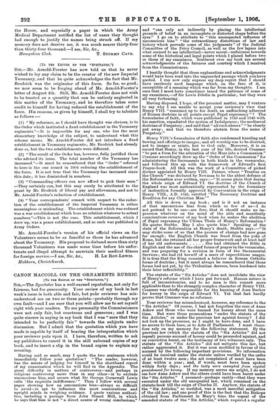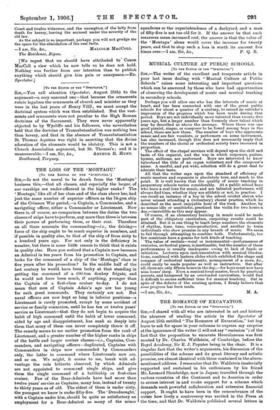CANON MACCOLL ON THE ORNAMENTS RUBRIC.
LTo THZ EDITOR Or THN "SPECTATOR..1 Siu,—The Spectator has a well-earned reputation, not only for fairness, but for generosity. Your review of my book in last week's issue is both able and fair, but yoilr reviewer has mis- understood me on two or three points—probably through my own fault—and I am sure that you will allow me to set myself right with your readers. To me personally the Commissioners were not only fair, but courteous and generous ; and I was quite sincere in saying in my book that I was "sure that they intended to be perfectly fair" towards the subjects under discussion. But I admit that the quotation which you have made is capable by itself of bearing the interpretation which
your reviewer puts upon it. I have, therefore, written to ask my publishers to cancel it in the still unbound copies of my book, and to insert a slip in the bound copies to explain my meaning.
Having said so much, may I quote the two sentences which immediately follow your quotation ? "The reader, howeverr, has the means of judging for himself in the shorthand report of my examination which he will find in the Appendix. The great difficulty in matters of controversy—and perhaps in religious controversy more than in any other—is to exclude unconscious bias, and secure what Sir George Cornewall Lewis calls the requisite indifference: " Then I follow with several pages showing how an unconscious bias—always so difficult to avoid—is apt to influence the most conscientious and upright minds in weighing evidence. I quote various authori- ties, including a passage from John Stuart Mill, in which he says that bias is not "a direct source of wrong conclusions," and "can only act indirectly by placing the intellectual grounds of belief in an incomplete or distorted shape before the eyes." I go on to attribute to "this unsuspected influence of unconscious bias " " the extraordinary distortions of law and history which pervade some of the judgments" of the Judicial Committee of the Privy Council, as well as the few lapses into what seemed to me intellectual—never moral—unfairness towards some of the historical and legal points which I placed before two or three of my examiners. Scattered over my book are several acknowledgments of the fairness and courtesy which I received from the Commissioners.
I hastily thought that these explanations and acknowledgments would have been read into the unguarded passage which you have quoted. I can now only express my deep regret that I should have carelessly used language which, on the face of it, is susceptible of a meaning which was far from my thoughts. I am sure that I must have sometimes taxed the patience of some of my examiners,—of Sir Lewis Dibdin in particular; but they were all very forbearing.
Having disposed, I hope, of the personal matter, may I venture to say why I am unable to accept your reviewer's view that Henry VIII. "remained up to his death an unflinching adherent of Roman doctrine in all points except Papal supremacy" ? The formularies of faith, which were published in 1543 and 1545 with his sanction, repudiated the system of Indulgences ; the mediaeval doctrine of Purgatory; and said that "all such abuses" " be clearly put away ; and that we therefore abstain from the name of Purgatory."
Henry VIII.'s formularies of faith also condemned kneeling and bowing and offerings to images; and all worship was to be directed, not to images or saints, but to God only. Moreover, it is on record that Henry, in the last year of his life, desired Creamer "to pen a form for the alteration of the Mass into a Communion." Cranmer accordingly drew up the "Order of the Communion" for administering the Sacraments in both kinds in the vernacular, and followed this up with the framework of Edward's first Prayer-book. All this was the work of a Committee of picked divines appointed by Henry VIII. Palmer, whose "Treatise on the Church" was declared by Newman to be the ablest defence of the Reformation ever written, says :—" It seems plain that during the whole reign of Edward VI. the doctrine of the. Church of England was most authentically represented by the formulary of instruction formally approved by Convocation in the reign of Henry VIII., A.D. 1545, entitled 'The Necessary Doctrine and Erudition for any Christian Man.'" All this is down in my book ; and is it not an instance of that unconscious bias from which so few of us—I do not pretend to be one—are free, that it should make no im- pression whatever on the mind of the able and manifestly conscientious reviewer of my book when he makes the abolition of Papal supremacy the Ultima Thule of Henry's Reformation ? He quotes Stubbs. May I also quote him ? Speaking of the state of the Reformation at Henry's death, Stubbs says :—" It may strike some of us that the process of change had now gone far enough : the English Church was freed from the yoke of Rome, but she retained all her proper framework and at least half of her old endowments She had obtained the Bible in English and the use of the chief forms of prayer in the vernacular, and was preparing for a revision in form of the Sacramental Services ; she had rid herself of a mass of superstitious usages. It is true that the King remained a believer in Roman Catholic .forms of doctrine ; but it must always be remembered that those forms had not yet, by the Tridentine decrees, been hardened into their later inflexibility."
The statute of the "Six Articles" does not invalidate the view of Henry's reforms which I have put forward. Human nature is full of inconsistencies, and to no man is this remark more applicable than to the strangely complex character of Henry VIII. Creamer was chiefly responsible for the burning of Joan Bucher for heresy in the reign of Edward VI. Yet that fact hardly proves that Creamer was no reformer.
Your reviewer has misunderstood, however, my reference to the "Six Articles." Of course, I had not forgotten the case of Anne Askew and those who were burned for heresy about the same time. But were those prosecutions "under the statute of the Six Articles," or under the previous law against heresy? I did not look up the processes, as I ought to have done, and I have no access to them here, or to Acts of Parliament. I must there- fore rely on my memory for the following statement. By the previous law (which the statute of the "Six Articles" did not repeal) persons accused of heresy could be proceeded against, and on conviction burnt, on the testimony of two witnesses only. The statute of the "Six Articles" did not mitigate this law, but rather aggravated it. But it was soon modified in favour of the accused by the following important provisions. No information could be received under the statute unless verified by the oaths of at least twelve men ; the act complained of must have been done within a year; and, if words, must have been spoken within forty days ; and the laity were exempted from capital punishment for heresy. If my memory serves me aright, I do not see how Anne Askew and the others could have been burnt under the "Six Articles." I assumed—perhaps rashly—that they were executed under the old unrepealed law, which remained on the statute-book till the reign of Charles II. Anyhow, the statute of the "Six Articles," as modified, was a most merciful mitigation of the old law ; and one proof of this is the fact that the Bishops obtained from Parliament in Mary's time the repeal of the amended statute of the "Six Articles," which required a regular
Court and twelve witnesses, and the exemption of the laity from death for heresy, leaving the accused under the severity of the old law. As the subject is so important, perhaps you will not grudge me the space for the elucidation of the real facts.
The Residence, Ripon.
[We regret that we should have attributed to* Canon MacColl a view which he now tells us he does not hold. Nothing was further from our intention than to publish anything which should give him pain or annoyance.—En. Spectator.]



































 Previous page
Previous page